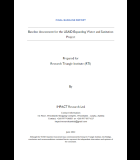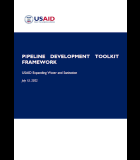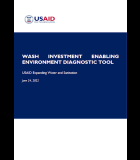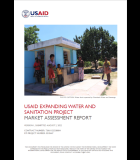Partnership for Integrated Social Marketing (PRISM)
Contaminated water is a leading cause of diarrheal disease and child mortality in Zambia, where only 64% of the population has access to safe drinking water sources. Among children under five, 21% have had diarrhea in the past two weeks, regardless of water source or location. Mortality among children under five is particularly high, as attempts to rehydrate children, usually with more contaminated water, often fail.
Rural children are disproportionately at risk as they lack both access to safe water and to health services and treatment for diarrheal diseases, including cholera and typhoid. Despite significant efforts to combat malaria, it remains the leading cause of morbidity and mortality in Zambia, with more than 4 million clinical and laboratory confirmed cases of malaria with more than 4,500 malaria deaths. (Zambia National Health Management Information System in 2011).
The 2010 Malaria Indicator Survey indicates 70% of Zambian households have at least one mosquito net, and 64% of households have at least one ITN, representing an increase from 2006. Fifty-five percent of all Zambian children under age five slept under a mosquito net the night before the survey, an increase from 2008 despite challenges in increasing overall net availability. Ninety percent of children under age five who slept under a net the night before the survey slept under a treated net. (MOH, 2010 Malaria Indicator survey).
Activity Description
The program conducts social marketing programs for health services and products in HIV prevention, family planning, malaria, and maternal and child health and is implemented by Society for Family Health (SFH), the local affiliate office of Population Services International (PSI). The PRISM’s local partners include the Zambia Health Education Communication Trust (ZHECT), Mwami Adventist Hospital, Luapula Foundation, Solwezi Youth Alive, and Development Aid from People to People (DAPP). International partners include Care International, the Population Council, Booz Allen Hamilton, Overseas Strategic Consulting, Jhpiego, and IntraHealth.
PRISM employs social marketing techniques to distribute male and female condoms for HIV prevention, family planning methods (oral and injectable contraceptives and implants), insecticide treated bed nets to prevent malaria and a point-of-use home water treatment solution to disinfect drinking water. The PRISM program also provides stand-alone testing and counseling for HIV and male circumcision services to prevent HIV infection among HIV-negative males.
The project’s objectives include:
• Increase supply and diversity of health products and services to distribute and deliver through the private sector, in conjunction with the public sector, for disease prevention and control as well as integrated health service delivery.
• Increase awareness of and demand for health products and services to emphasize prevention of childhood illnesses, unintended and unsafe pregnancies, HIV infection and STIs, and malaria and to build an informed, sustainable consumer base.
• Develop the ability of a commercial/private sector entity to produce and market at least one currently social marketed health product or service in a sustainable, self-sufficient manner.
• Integrate service delivery and other activities, emphasizing prevention, at national, provincial, district, facility, and community levels through joint planning with the GRZ and other partners.
• Increase awareness of, demand for, and use of misoprostol through the private sector, in conjunction with the public sector, primarily to prevent postpartum hemorrhage (PPH)
• Increase awareness of, demand for, and use of zinc complementing oral rehydration therapy (ORT) through the private sector, in conjunction with the public sector, in the management of acute diarrheal diseases among children.
Expected Outcomes
• Market Clorin to disinfect 10 billion liters of drinking water in order to reduce the incidence of diarrhea in the under five population by September 30, 2014
• At least 595,328 individuals reached through community outreach that promotes HIV/AIDS prevention through other behavior change beyond abstinence and/or being faithful (e.g., condoms, knowledge of HIV status)
• Train 2,700 individuals to promote HIV/AIDS preventive behaviors other than abstinence and/or being faithful
• Distribute at least 2 million ITNs
• Develop and implement a strategy to transfer the ANC ITN program to MOH and ensure that the MOH independently manages the MIP program, including procurement, distribution and promotion of ITNs, by September 30, 2013
• Maintain supplies of ITNs to all the 72 DHMTs nationwide annually
• Train 2,000 community outreach workers to promote the correct and consistent use of ITNs
Actual Outcomes
• PRISM distributed 13,898,050 bottles of Clorin, enough to treat 9.27 billion liters of water and benefit 1.1 million households with an average of 6 members for a year in all the 10 provinces of Zambia.
• PRISM project distributed 10.435 million cycles of Safeplan3 oral contraceptives in supported facilities countrywide including commercial outlets (registered pharmacies and clinics), DHMT clinics and trained Community Volunteers, representing a 41% achievement of the target 25.6 million.
• 206,744 HTC clients received reproductive health and family planning messages at PRISM New Start voluntary HIV counseling and testing centers and 67,190 female clients were referred for family planning services
• PRISM project provided HTC services to 1,021,629 clients through 10 static New Start outlets as well as mobile clinic.





